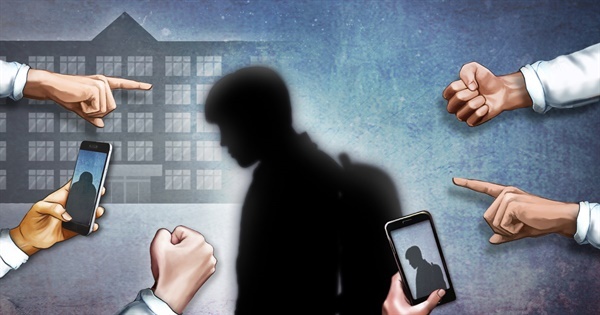 |
(Yonhap) |
Celebrities and athletes are facing public outrage, following a string of accusations of past bullying.
Following the bullying scandal that damaged the careers of four professional volleyball players this month, another volleyball player Park Sang-ha retired on Monday after admitting to allegations of school violence. Over the weekend, another allegation was raised that Hanwha Eagles baseball player Yoo Jang-hyuk assaulted and bullied a school mate during elementary school.
The revelations are not limited to the sports community. Over the past few days, a string of victims alleged that they were bullied by celebrities when they were in school. Starting with actor Cho Byung-kyu, allegations of school violence have been pouring in, including against girl group (G)I-dle member Soo-jin, Seventeen’s Mingyu, singers Kim So-hye and Jin Hae-seong, and actors Park Hye-soo and Kim Dong-hee. Currently, they deny the allegations and say they will take legal action.
Experts see these revelations through online communities as a kind of “public punishment” as the legal system’s punishment for school violence is relatively weak.
Kwak Geum-ju, a psychology professor at Seoul National University, said, “The recent revelation of school violence against celebrities is due to (the victims’) trauma that remains until adulthood. They want to heal the resentment and wounds they suffered in the past and to demand an apology.”
According to a survey by the Ministry of Education, the number of students who said they were bullied increased from about 37,000 in 2017 to around 60,000 in 2019.
Despite the increase, punishment for violence and bullying is still weak. Under the current laws, children under the age of 14 cannot be punished for any crime. A family court can impose protective measures for those between the ages of 10 and 14 years old, but the measure is not a criminal punishment. Those between the ages of 14 and 19 can be criminally punished, but if they are convicted they are usually put on probation.
Experts said that society should recognize the seriousness of school violence.
Park Ok-sik, director of the Youth Violence Research Institute, said, “Teenagers are mature enough as their physical maturity and cognitive development are much faster than in the past. It is not appropriate to distinguish school violence from adult crime.”
“There are many cases in which minors abuse the juvenile law, knowing that they cannot be punished,” Park said.
Seung Jae-hyun, a researcher at the Korean Institute of Criminology, said, “Recent school violence has been so sophisticated and organized that the nature of the crime is comparable to adult violence.”
“In this case, it should be treated as a criminal case and the public power should actively intervene. When violence occurs, taking measures against the perpetrator in time is a way to prevent secondary damage such as trauma,” he said.
On Tuesday, Prime Minister Chung Sye-kyun mentioned the ongoing violence in the nation’s sports community at a cabinet meeting.
“We need to improve the structural problems (in the sports community) that are prone to violence, such as meritocracy, the rigid hierarchy and closed training environment,” he said, adding that the misguided belief that sometimes violence is needed to improve grades must be eliminated.
By Shin Ji-hye (
shinjh@heraldcorp.com)








